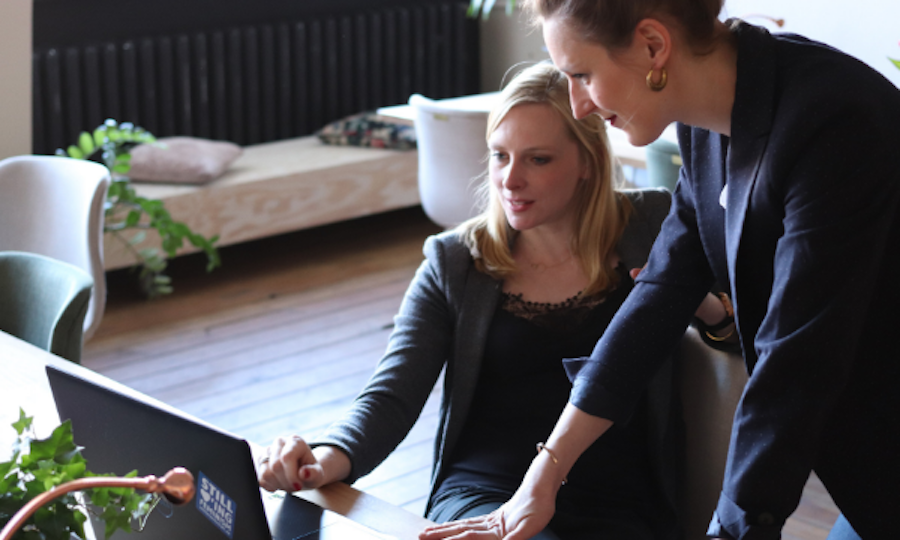How to Create Community and Inclusivity For Women in the Workspace

Before founding The Riveter, a modern union for working women, I was a corporate litigator for over a decade in New York City and Seattle. I had a successful career, but the moment I announced I was pregnant, corporate America’s perception of me changed. Questions arose about whether I would want to join high profile cases or travel for work. I was passed on for a promotion. The world now saw me as a mother first and an attorney second. There were clearly doubts as to whether I could be both.
The system was not working for me, so I decided I needed a different path for me and my family. I set out to start my own business (as if having two daughters under two and just finding out I was pregnant with a third wasn’t enough chaos). As I prepared to pivot into entrepreneurship, I knew I would need new skills and a different kind of network. I sought this out by visiting several coworking spaces with business courses. I thought I would find a community of similar-minded people that had embarked on this same path and I could look to for inspiration and guidance.
I was floored to find that every one of these coworking spaces, each of which promised to be a welcoming community for people like me, felt as exclusive to women as the male-dominant corporate settings I had left behind. From foosball tables to video games to kegs, these communal spaces were not somewhere I felt welcome as a thirty-something-year-old mother of two.
So I wondered: if women like me crave community and personal interactions–and quite frankly need them to succeed professionally, whether in a corporate setting or as business owners–then why are these services so sorely lacking?
This is how The Riveter was born. I set out to create and build an experience and space with women in mind first. Not a space that excludes men, but somewhere where women aren’t an afterthought. We intentionally focus on working women’s needs, amplify their voices, and equip them with resources to make the workplace diverse and inclusive.
My hope is that The Riveter’s movement inspires change in every corner of this country. If we are truly going to make equity of opportunity in work and business reality, we share the responsibility to reinvent our workspaces into places where both women and men will thrive.
Employees should take initiative to form alliances and advocate for change in the professional setting. Here are a few things to consider if you feel your workplace would benefit from a stronger sense of community for women and allies:
- Form groups of like-minded people e.g. Employee Resource Groups (or join one)
Employee Resource Groups (ERGs) are a powerful way to drive change at a company. ERGs are voluntary, employee-led groups comprised of employees that share common interests, backgrounds, or demographic factors. These groups give employees an opportunity to be heard, valued, and engaged. If you don’t have access to these in your company, speak to your leadership and take the initiative to begin an employee group. Fostering a welcoming space for tough conversations is a great way to build community.
- Celebrate successes
Women need to support other women in the workplace. It’s that simple. Did one of your colleagues close a big sale or deliver a flawless pitch at a client meeting? Share those successes with their manager and other decision-makers at your company. Not only are you ensuring credit is given where it’s due, but you’re building a bench of sponsors who will do the same for you in the future.
- Encourage collaboration
Are you part of an ongoing email chain that arrives nowhere day after day? We’ve all been there. Technology allows us to work together from the (relative) comfort of our desks, but I am a big proponent of in-person meetings. I like to connect with my colleagues and get to know them.
Use this as an opportunity to bring people together and implement a human touch to your work. You learn about each other as people and thus create better working relationships (and maybe you find someone who agrees to form an ERG with you!).
- Find or become a mentor
Having people in your corner is absolutely critical to professional advancement. Unfortunately, women have fewer opportunities for female mentorship as they rise in their careers, but I encourage you to be bold in asking someone you admire–and who might look nothing like you–to be your mentor. If you’re lucky, you could find someone to help you navigate tough career decisions, serve as lifetime friends and allies, and help you expand your network. And if you have a mentor already, I encourage you to become a mentor yourself!
This all takes energy and time, yes, but, in the grand scheme of things, they are small steps we can all take to create more inclusive workplaces for women and collectively advance our access to opportunity. We deserve better and the only way we’ll achieve it is together.


